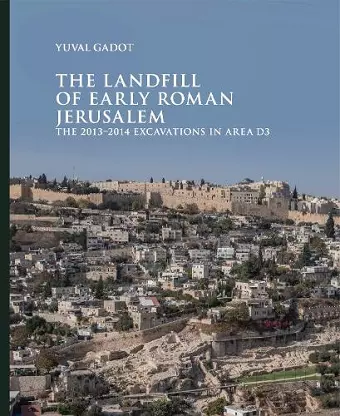The Landfill of Early Roman Jerusalem
The 2013‒2014 Excavations in Area D3
Format:Hardback
Publisher:Pennsylvania State University Press
Published:13th Sep '22
Currently unavailable, and unfortunately no date known when it will be back

Sheds light on a crucial time period in Western historical perception of Jerusalem through the lens of its trash.
A multi-disciplinary, comprehensive examination of the landfill through pottery, glass, and metal analysis, as well as numismatics, zooarchaeology, and archaeobotanics.
Valuable for undergraduate and graduate students of Bible, archaeologists, scholars of early Judaism, and New Testament scholars
This is the story of the landfill that operated in Jerusalem during the first century CE and served as its garbage dump during the ca. 50-year period that followed Jesus’s crucifixion through to the period that led to the great revolt of the Jews just prior to the city’s destruction.
The book presents an extensive investigation of hundreds of thousands of items that were systematically excavated from the thick layers of landfill. It brings together experts who conducted in-depth studies of every sort of material discarded as refuse—ceramic, metal, glass, bone, wood, and more. This research presents an amazing and tantalizing picture of daily life in ancient Jerusalem, and how life was shaped and regulated by strict behavioral rules (halacha). The book also explores why garbage was collected in Jerusalem in so strict a manner and why the landfill operated for only about 50 years. Half a century of garbage from Early Roman–period Jerusalem provides an abundance of new data and new insights into the ideological choices and new religious concepts emerging and developing among those living in Jerusalem at this critical moment. It is an eye-opener for archaeologists, historians, anthropologists, and theologians, as well as for the general reader.
“The studies in this volume provide a fascinating window into Early Roman Jerusalem by presenting the results of the meticulous excavation of a massive garbage dump on the southeastern slope of the City of David. The comprehensive and detailed analyses of the various categories of finds—including pottery, coins, stone vessels, glass, animal and fish bones, and wood—indicate the existence of an organized system of rubbish disposal, much of which appears to represent ordinary household waste. These studies therefore add a valuable new dimension to our understanding of daily life in late Second Temple Jerusalem.”
—Jodi Magness, University of North Carolina at Chapel Hill
“This book is a must read for everyone interested in the up-to-date topic of archaeo-garbology. Gadot and his team vividly demonstrate why ancient refuse is a strong proxy for identifying societal changes in the urban domain of Jerusalem during Roman times. This synthesis is a true goldmine of quantitative data that introduces us to the repertoire of vessels and the diet of the people in this large metropolis temple-city during one of its peak historical periods. It is these mundane leftovers that provide us with the facts and events of the daily life and economy of Jerusalemites 2000 years ago.”
—Guy Bar-Oz, University of Haifa
- Nominated for G. Ernest Wright Award 2024
ISBN: 9781646022151
Dimensions: 262mm x 211mm x 29mm
Weight: 1293g
320 pages